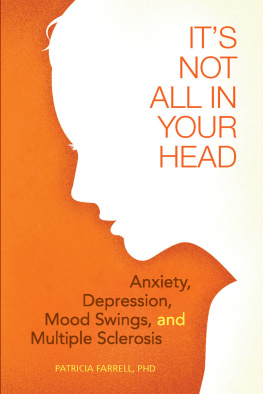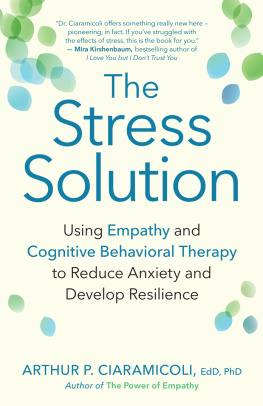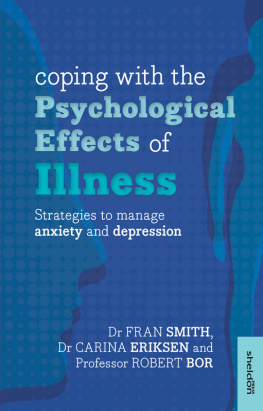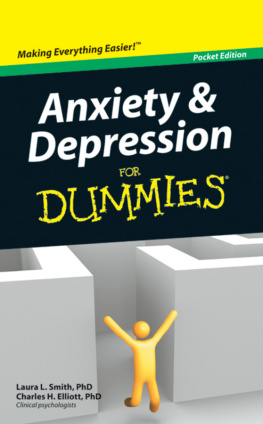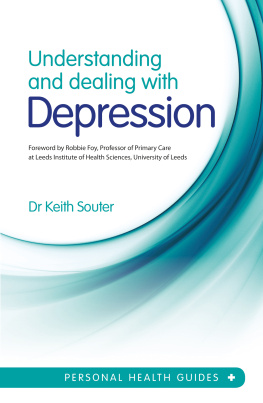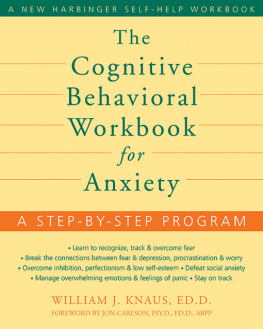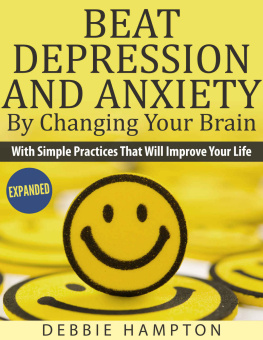It's Not All in Your Head
It's Not All in Your Head
Anxiety, Depression, Mood Swings, and Multiple Sclerosis
Patricia Farrell, PhD
Acquisitions Editor: Noreen Henson
Cover Design: Carlos Maldonado
Compositor: Absolute Service, Inc.
Printer: Hamilton Printing Company
Visit our Web site at www.demoshealth.com
2010 by Patricia Farrell. All rights reserved. This book is protected by copyright. No part of it may be reproduced, stored in a retrieval system, or transmitted in any form or by any means, electronic, mechanical, photocopying, recording, or otherwise, without the prior written permission of the publisher.
Medical information provided by Demos Health, in the absence of a visit with a health care professional, must be considered as an educational service only. This book is not designed to replace a physicians independent judgment about the appropriateness or risks of a procedure or therapy for a given patient. Our purpose is to provide you with information that will help you make your own health care decisions.
The information and opinions provided here are believed to be accurate and sound, based on the best judgment available to the authors, editors, and publisher, but readers who fail to consult appropriate health authorities assume the risk of any injuries. The publisher is not responsible for errors or omissions. The editors and publisher welcome any reader to report to the publisher any discrepancies or inaccuracies noticed.
Library of Congress Cataloging-in-Publication Data
Farrell, Patricia.
Its not all in your head : anxiety, depression, mood swings, and multiple sclerosis / Patricia Farrell.
p. cm.
Includes index.
ISBN 978-1-932603-95-8
1. Multiple sclerosisPsychological aspects. 2. Multiple sclerosisPatientsMental health. 3. Multiple sclerosisComplications. 4. Depression, Mental. 5. Anxiety. I. Title.
RC377.F37 2011
616.8'34--dc22
2010038314
Special discounts on bulk quantities of Demos Health books are available to corporations, professional associations, pharmaceutical companies, health care organizations, and other qualifying groups. For details, please contact:
Special Sales Department
Demos Medical Publishing
11 W. 42nd Street
New York, NY 10036
Phone: 8005328663 or 2126830072
Fax: 2129417842
E-mail: rsantana@demosmedpub.com
Made in the United States of America
10 11 12 13 5 4 3 2 1
Contents
This book is intended for anyone with a diagnosis of multiple sclerosis (MS) who has to live with the anxiety and depression from it as well.
When researching this book, one statement I came across really summed up the relevance of testing and of getting a definitive diagnosis on depression. It was the researchers opinion that only one question was needed and that was, Are you depressed? It was simple and to the point and 94% of the people who responded Yes were, in fact, found to be depressed upon further evaluation.
I have had many years of direct clinical and research experience and have been fortunate to have been trained by some exceptional professionals. This training has led me to understand that we are each truly the best judges of our own illnesses. So you are the best person to answer the question Are you depressed?
As one physician with whom I worked said to a patient, You know your body best. It may not always seem that way to others, but our experience of our lives is unique and, therefore, cannot be categorized into a set of numbers and test results.
In this book, youll see several people I interviewed who knew their bodies, but had to try very hard to convince professionals that there was something wrong before they got their diagnosis of MS. It is a tribute to their courage and motivation to work toward health and, I hope, an inspiration for readers. As youll see, sometimes you just have to trust your instincts.
I believe that if you wish to take several tests to get an official diagnosis of depression and/or anxiety, this can be accomplished quite easily on the Internet. Some of the self-test sites out there are supported by well-known, major medical and research institutions, and I urge you to seek them out if you truly wish to take some tests. Most of the tests taken prior to having an in-person clinical evaluation by a mental health professional and offered by reputable sites will indicate if you suffer from depression.
It is my intention with this book to help people living with MS to self-direct themselves to help alleviate some of the emotional symptoms related to MS. Although not a substitute for one-on-one therapy, I believe this book can be an important addition to both understanding MS and utilizing some of the tools that research has shown to be especially helpful in autoimmune disorders relative to anxiety, depression, and quality of life. One area of special note and where research is especially exciting is exercise, and Ive provided a sterling example of one person who has fought the odds of his primary progressive MS with amazing results. Again, hes one individual, but new studies correlating exercise with the lessening of symptoms of MS are popping up every day.
The book starts with a basic understanding of MS as an autoimmune disorder and what that entails. It then continues with the workings of the central nervous system and how that relates to MS and the usual accompaniment of anxiety and depression for persons with MS. Also included are chapters on the things that you can do to help yourself, on looking forward to the future in terms of research and research breakthroughs, as well as a section that provides names and Web sites for organizations, books, and articles that will provide further information and assistance for people living with MS.
Actual people with MS have been interviewed for this book, and have discussed their methods of coping with living with MS. Weve also included interviews with researchers in the area of MS and depression, and several techniques that research has shown to be helpful regarding depression, anxiety, and the immune system.
The book is not intended to be technical and difficult to understand, nor do I engage in anything near psychobabble. I am a proponent of using easily understood ways to tackle complicated ideas.
We know that MS is not all in your head, as one patient said to her treating physician. It is a chronic illness that brings with it biologically driven psychological changes. These changes can often be difficult to endure but they are not totally psychological. There are, of course, psychological changes associated with accepting the diagnosis and resulting changes in functioning relative to any chronic illness, but you are not helpless here, either. We know that this is a two-way disorder and that anything you can do in terms of your thinking about the disorder and self-help will benefit you.
The basic aim of the book, therefore, is to provide concrete ways to help you help yourself psychologically and, in turn, your immune system. The connection between the two is, I believe, now fairly well-established. Therefore, anything you do for yourself in terms of lessening anxiety, depression, and stress is going to benefit you psychologically and physically.
As one woman thoughtfully said to me, I have MS but MS does not define me. It does not define you, either.
Books are never the product of one person or of one writers efforts, but rather they are the efforts of all those who participated in interviews and provided access to their innermost thoughts and concerns, who provided direction for the writer in terms of research, life stories, or just things that needed to be considered. A book, therefore, is a collaborative effort and to fail to acknowledge this would be unacceptable for me or for any writer.
Next page
